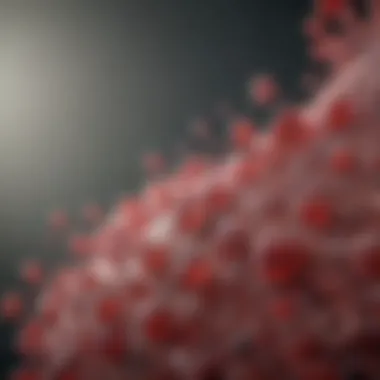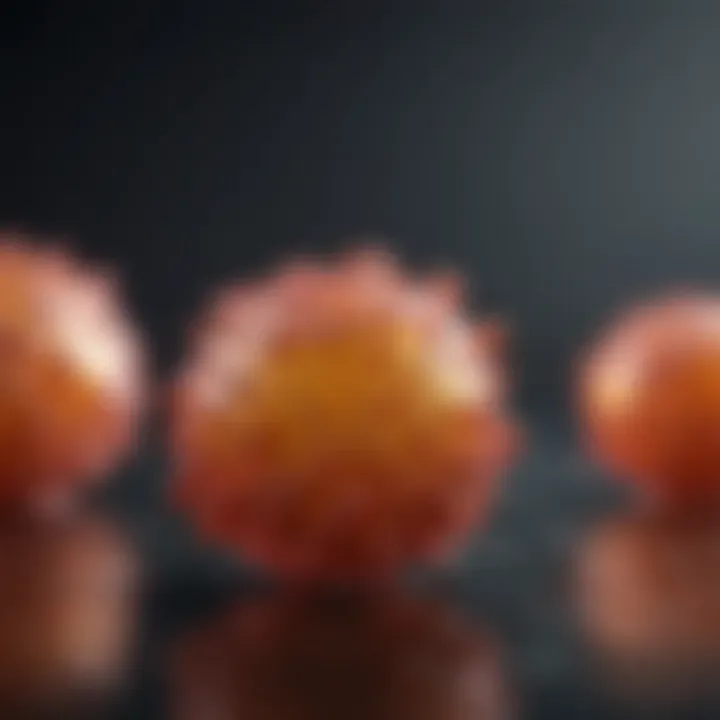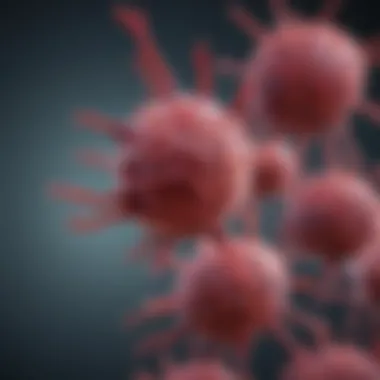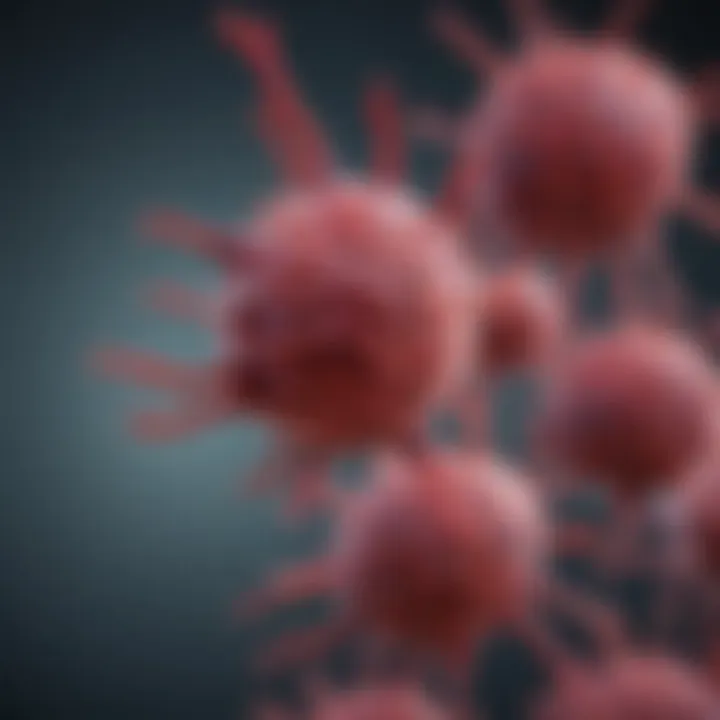Significance of Ros1 Antibody in Cancer Research


Intro
The study of cancer has progressed significantly over the last few decades, leading to the identification of novel biomarkers and therapeutic targets. Among these targets are Ros1 receptors, which have gained prominence due to their association with various malignancies. Understanding how Ros1 antibodies function and their importance in cancer research is crucial for developing effective treatment strategies.
Ros1 is a receptor tyrosine kinase that, when altered, is implicated in tumorigenesis. The presence of Ros1 in certain cancers provides a unique opportunity for targeted therapies. This article aims to elucidate Ros1's biological role, the therapeutic potential of Ros1 antibodies, and the latest advancements in research and clinical applications.
Research in this field is not limited to basic science, but is also oriented towards clinical implications, making the exploration of Ros1 antibodies essential for both researchers and healthcare practitioners. In subsequent sections, the article will present key findings on Ros1, discuss implications of this research, and highlight future directions in Ros1-focused cancer therapies.
Preamble to Ros1 Antibody
The Ros1 antibody has garnered substantial attention in the realm of cancer research. Its relevance has developed alongside the growing understanding of oncogenes, particularly Ros1, which plays a significant role in tumor biology. The application of Ros1 antibodies offers insights into both the diagnostic and therapeutic dimensions of cancer treatment, making this a critical area of study for researchers and medical professionals alike.
Definition and Overview
Ros1, a member of the receptor tyrosine kinase family, is implicated in various cellular functions, including growth and differentiation. The Ros1 antibody specifically recognizes and binds to the Ros1 protein, enabling researchers to investigate its expression and activity in cancerous tissues. This action is essential for understanding how Ros1 contributes to tumorigenesis. Moreover, it can facilitate the development of targeted therapies that inhibit Ros1 activity in malignancies.
Some of the key features of the Ros1 antibody include:
- High specificity towards the Ros1 protein
- Ability to detect Ros1 alterations in different types of cancers
- Potential use in guiding treatment decisions for patients with Ros1-positive tumors
Historical Context
The exploration of Ros1 and its antibodies traces back to the early 1980s, when researchers first identified the gene's role in certain cancers. It was initially characterized in the context of glioblastomas and later found in non-small cell lung cancer and other malignancies. Over the years, scientific advancements have led to the development of monoclonal antibodies targeting Ros1. These developments have paved the way for clinical applications and increased awareness regarding Ros1 as a therapeutic target.
Notable milestones in Ros1 antibody research include:
- The first identification of Ros1 gene fusions in cancer, which highlighted its oncogenic properties
- The generation of specific antibodies enabling targeted detection and therapy
- Ongoing clinical trials investigating the efficacy of Ros1-targeted therapies across various cancers
Understanding the importance of Ros1 antibodies provides a foundation for innovative cancer treatments and fosters a deeper appreciation for the molecular mechanisms underlying cancer biology.
Molecular Structure of Ros1
Understanding the molecular structure of the Ros1 receptor is vital for grasping how it functions in the context of cancer biology. The structure itself determines its role in signaling pathways and interaction with other cellular components. This section will explore the key elements that comprise the Ros1 protein and examine how specific features enable its functionality in both normal physiology and in the context of tumorigenesis.
Protein Domains and Functions
The Ros1 protein is characterized by several distinct domains that contribute to its functionality. At its core, it contains an extracellular region, a single transmembrane domain, and an intracellular signaling domain. These domains play a critical role in mediating cellular communication.
- Extracellular Region: This part binds to ligands, allowing for the activation of downstream signaling pathways. The binding ultimately influences cellular behaviors, such as growth and differentiation.
- Transmembrane Domain: It spans the cellular membrane and facilitates the transmission of signals from the extracellular environment into the cell.
- Intracellular Signaling Domain: This area is crucial for initiating various signaling cascades upon receptor activation. It interacts with other proteins, leading to biological responses that can promote or inhibit tumor growth.
Understanding how these domains integrate is essential for developing targeted therapies aimed at inhibiting Ros1 activity in cancerous cells. Researchers explore these domains to design antibodies that can interfere with the function of Ros1, providing therapeutic avenues for combating Ros1-driven cancers.
Genetic Encoding and Mutations
The gene encoding Ros1 is located on chromosome 6, and its expression can be altered through mutations or chromosomal rearrangements. Genetic alterations in the Ros1 gene can lead to oncogenic changes, making the study of these aspects crucial in cancer research. Mutations may result in the production of a constitutively active form of the receptor, which contributes to uncontrolled cell proliferation.
Key aspects of Ros1 genetic encoding include:
- Exon Structure: The Ros1 gene consists of several exons, which can be subject to mutations that alter protein function.
- Fusion Proteins: In many cancers, particularly lung adenocarcinoma, Ros1 is involved in gene fusion events. These fusions create hybrid proteins that can transform normal signaling pathways, leading to oncogenesis.
- Mutational Landscape: Studies have found that specific point mutations can affect the binding affinity of antibodies aimed at targeting Ros1, influencing therapy outcomes.
Role of Ros1 in Normal Physiology
The role of Ros1 in normal physiology is fundamental to understanding its function and significance in cancer research. Ros1 plays crucial roles in various biological processes and pathways that are vital for normal cellular activities. An adequate comprehension of these physiological roles provides insight into how alterations in Ros1 can lead to tumorigenesis and malignancies.
Function in Neural Development
Ros1 is essential for neural development. It contributes to the growth and differentiation of neurons during embryonic development. Ros1 signaling is involved in guiding neuronal migration and synapse formation. Research shows that the activation of Ros1 can enhance neurogenesis, leading to the production of new neurons in certain contexts. This vital function suggests that Ros1 may be implicated in neurodevelopmental disorders if its signaling pathways become disrupted.
In addition to neurogenesis, Ros1 contributes to neuronal survival by promoting cell proliferation and inhibiting apoptosis. Such properties underscore its importance in both the development and maintenance of the nervous system. Deficiencies or mutations in Ros1 can impact these processes, leading to potential neurological issues and disorders.
Impact on Cellular Signaling Pathways
Ros1 also plays a significant role in various cellular signaling pathways beyond neural development. The Ros1 receptor tyrosine kinase is involved in the regulation of processes such as cell growth, differentiation, and migration. When Ros1 is activated, it initiates a cascade of signaling events that facilitate these key functions.


The primary signaling pathway associated with Ros1 is the RAS/MAPK pathway, which is critical for cellular proliferation and survival. Activation of Ros1 leads to the recruitment of adaptor proteins, which, in turn, activate downstream signaling cascades. This cascade influences not only cellular proliferation but also responses to external growth factors.
Moreover, Ros1 interacts with pathways such as the PI3K/AKT pathway, which has implications for cell survival and metabolism. The interplay between Ros1 and these pathways highlights its multifaceted role in maintaining cellular homeostasis. Disruptions in these signaling processes can result in unchecked cell growth and survival, characteristic of cancer cells. Understanding these interactions offers implications for cancer therapies that target Ros1.
"The activation of Ros1 receptor tyrosine kinase can lead to significant downstream effects on cell behavior, impacting everything from growth to survival."
In summary, the study of Ros1 in normal physiology elucidates its crucial contributions to both neural development and cellular signaling pathways. These insights lay the groundwork for a more profound understanding of Ros1’s implications in cancer biology.
Ros1 and Cancer Biology
The relationship between Ros1 and cancer biology represents a significant area of study in oncological research. Ros1, originally associated with normal cell functions, has been found to exhibit oncogenic properties when altered. This duality highlights the importance of understanding both the normal and abnormal roles of Ros1 in cellular processes.
Oncogenic Properties of Ros1
The oncogenic properties of Ros1 become apparent through its ability to drive tumorigenesis in various cancers. When the Ros1 gene undergoes mutations or rearrangements, it can lead to the production of fusion proteins that exhibit constitutive activation. This results in uncontrolled cellular proliferation and survival.
Research indicates that Ros1 plays a role in the development of specific cancer types, notably lung cancer. The Ros1 gene rearrangements occur in a subset of non-small cell lung cancers (NSCLC), occurring in approximately 1-2% of cases. The presence of Ros1 fusions confers a unique tumor biology and therapeutic response, creating a distinct profile that researchers seek to understand further.
The mechanisms by which Ros1 promotes oncogenesis include the activation of signaling pathways involved in cell growth and division, such as the MAPK and PI3K pathways. These pathways, when continuously stimulated due to aberrant Ros1 activity, can lead to increased cell division and resistance to programmed cell death, ultimately contributing to tumor growth.
Researchers are investigating Ros1 not only as a driver of cancer but also as a potential target for therapeutic intervention. The identification of specific Ros1 mutations in tumors often guides targeted therapy decisions, underscoring the need for precision medicine approaches in oncology.
Common Cancers Associated with Ros1 Alterations
The range of cancers linked to Ros1 alterations extends beyond lung cancer. The following types of cancers have shown associations with Ros1 activity:
- Lung Cancer: As mentioned, non-small cell lung cancer is the most notable example. Ros1 fusions in NSCLC represent a target for therapies such as crizotinib.
- Colorectal Cancer: Cases of colorectal cancer have been found to exhibit Ros1 alterations, though these are less common.
- Breast Cancer: Certain subtypes of breast cancers, particularly those that are triple-negative, have shown links to aberrant Ros1 expression.
- Glioblastoma: This aggressive brain cancer has also been studied in relation to Ros1 gene alterations, indicating a potential new avenue for exploration in treatment strategies.
"The presence of Ros1 alterations in various cancers makes it a compelling subject for ongoing research and potential therapeutic targeting.”
Identifying and understanding the specific Ros1 alterations across cancer types is essential for developing targeted treatments. Laboratory and clinical studies continue to reveal the complexity and significance of Ros1 in cancer biology. As the landscape of cancer treatment evolves, so too does the importance of Ros1 as both a biomarker and a target for therapy.
Mechanisms of Action of Ros1 Antibodies
Understanding the mechanisms of action of Ros1 antibodies is crucial in cancer research. These mechanisms define how effectively these antibodies can target and inhibit cancer cells that express aberrant Ros1. This section details the specific interactions and biological effects induced by Ros1 antibodies, which underscore their therapeutic potential in oncology.
Binding Affinity and Specificity
Binding affinity refers to the strength of the interaction between an antibody and its antigen. Ros1 antibodies exhibit high binding affinity for the Ros1 receptor. This affinity is essential as it ensures that the antibodies efficiently target the specific cells that overexpress Ros1 due to mutations or gene amplification.
Moreover, specificity is crucial in minimizing off-target effects. Ros1 antibodies are designed to selectively bind to the Ros1 protein without significantly interacting with similar proteins. This precision enhances their therapeutic efficacy, as it limits damage to normal cells and focuses the treatment on the tumor cells. The processes involved in the development of these antibodies often include extensive screening and refinement to achieve optimal binding properties.
"A high binding affinity, coupled with great specificity, enhances the therapeutic window of Ros1 antibodies, making them viable treatment options for patients with Ros1-positive tumors."
Recent studies have shown that these antibodies can effectively engage Ros1 receptors, triggering internalization and subsequent degradation of the receptor. This reduces the signaling pathways associated with tumor growth and metastasis, providing a dual mechanism of action: direct targeting and downregulation of oncogenic signaling.
Inhibition of Tumor Growth
The inhibition of tumor growth by Ros1 antibodies is a pivotal aspect of their function in cancer therapy. Once the antibodies bind to the Ros1 receptors on the surface of cancer cells, they can instigate several downstream effects that culminate in growth inhibition.
One mechanism includes the blockade of Ros1-induced signaling pathways, such as the MAPK and PI3K/Akt pathways. These pathways are crucial for cell survival, proliferation, and migration. By disrupting these signals, Ros1 antibodies can effectively hinder the growth and spread of the tumor.
Additionally, the engagement of these antibodies can activate immune responses against the tumor cells. The immune system can recognize and attack cells marked by the antibodies, which is particularly beneficial for cancers that are otherwise resistant to conventional therapies.
The combination of these effects makes Ros1 antibodies not only blockers of cell growth but also enhancers of systemic immune responses capable of addressing cancer more comprehensively. As research continues in this area, the potential for improved treatment strategies is becoming clearer, integrating Ros1 antibodies into broader therapeutic regimens.
Therapeutic Applications of Ros1 Antibodies
The therapeutic applications of Ros1 antibodies play a pivotal role in the realm of cancer treatment. These antibodies provide targeted therapy options for patients with specific Ros1 gene alterations. Given the increasing recognition of personalized medicine, Ros1 antibodies represent an important aspect of tailored treatment strategies, potentially improving patient outcomes.
Clinical Trials and Outcomes
Clinical trials have been fundamental in establishing the efficacy of Ros1 antibodies in treating various cancers. One notable drug is crizotinib, which has been widely utilized in clinical settings. The results from trials indicate promising response rates in patients with Ros1-positive lung cancer.
- In trials, patients have shown a significant reduction in tumor size.
- The overall survival rates have improved compared to traditional chemotherapy.
- Adverse effects are typically manageable, though fatigue, nausea, and liver enzyme elevations are common.


Data from the trials also suggest that Ros1 antibodies may lead to a durable response, allowing longer periods of remission for patients. Furthermore, the Biomarker-driven approach has encouraged ongoing studies to understand better who will benefit most from this targeted therapy.
"Ros1-targeted therapies offer a new hope for patients with otherwise difficult-to-treat cancers."
Combination Therapies with Ros1 Antibodies
Combination therapies that include Ros1 antibodies present a promising frontier in cancer treatment. By integrating these antibodies with other treatment modalities, researchers aim to enhance therapeutic efficacy and overcome potential resistance mechanisms seen in tumors.
- Targeting Multiple Pathways: Combining Ros1 antibodies with other targeted agents like EGFR inhibitors has shown preclinical promise.
- Chemotherapy Synergy: Ongoing studies assess if the addition of traditional chemotherapy can improve outcomes when paired with Ros1 therapy.
- Immunotherapy Interactions: The confluence of immune checkpoint inhibitors and Ros1 antibodies could potentially amplify the immune response against tumors.
This multifaceted approach could address patient-specific tumor biology, tailoring treatment more effectively. Ongoing clinical trials continue to explore these combinations. They aim to decipher the optimal sequences and dosages that maximize the benefits while minimizing side effects.
The therapeutic landscape for Ros1 antibodies is rapidly evolving, reflecting advancements in oncology and the pressing need for innovative cancer therapies.
Challenges in Ros1 Antibody Research
The exploration of Ros1 antibodies is a promising avenue in cancer treatment, yet it is not without its challenges. Addressing these challenges is crucial for the advancement of effective therapeutic strategies. This section delineates two prominent obstacles: the resistance mechanisms employed by tumors and the regulatory and safety issues that surround the development and application of Ros1 antibodies.
Resistance Mechanisms in Tumors
The emergence of resistance in tumors presents a significant hurdle in the effectiveness of Ros1 antibodies. Tumors can adapt through various mechanisms. For instance, point mutations in the Ros1 gene can alter its structure, diminishing the capacity of antibodies to bind to the target. Such mutations have been documented in patients undergoing treatment, resulting in treatment failure. In addition, tumor cells may upregulate alternative signaling pathways that provide a survival advantage, effectively bypassing the Ros1 inhibition.
Some observed resistance mechanisms include:
- Mutations in the kinase domain: These mutations can hinder the binding of antibodies, allowing tumor cells to continue proliferating despite the treatment.
- Activation of compensatory pathways: Tumors may activate other growth factor receptors, generating signals that promote cell survival independent of Ros1 activity.
- Heterogeneity within tumors: Not all tumor cells carry the same mutations or characteristics. This variability can lead to a subset of cells being resistant even when the majority are responsive to treatment.
These mechanisms necessitate ongoing research to identify and understand the specific mutations present in tumors. Tailoring treatments based on individual tumor profiles could enhance the effectiveness of Ros1 antibodies.
Regulatory and Safety Issues
The regulatory landscape governing the use of Ros1 antibodies is complex and can pose additional challenges for researchers and clinicians. Safety considerations are paramount in any therapeutic development, especially in oncology, where treatments may have profound effects on the patient's health.
The following points highlight some pertinent regulatory and safety considerations:
- Long-term effects: There is a continuous need for data on the long-term effects of Ros1 antibody treatments. Monitoring patients over time is crucial to assess the risk of delayed side effects or secondary malignancies.
- Clinical trial requirements: Regulatory bodies like the Food and Drug Administration (FDA) impose stringent guidelines to ensure the safety and efficacy of therapeutic agents. This can delay the introduction of innovative treatments.
- Informed consent: Patients must be fully informed about the potential risks and benefits of treatments involving Ros1 antibodies. Ethical considerations around patient consent and comprehension of trial participation are critical.
Engaging with regulatory agencies early in the research process can help identify potential pitfalls and streamline development pathways for Ros1 antibodies.
Future Directions in Ros1 Antibody Development
The future directions in Ros1 antibody development signal a transformative phase in cancer research. As understanding of Ros1's functions grows, researchers can leverage this knowledge to innovate new therapies. The emphasis on refining antibody design and enhancing their clinical applications becomes crucial for overcoming existing limitations. A clear focus on how these advancements can potentially alter treatment landscapes reflects the profound importance of this area.
Innovative Approaches and Technologies
The advent of innovative approaches plays a vital role in advancing Ros1 antibody development. Next-generation sequencing technologies provide researchers with detailed genetic information, enabling them to tailor antibodies that target unique mutations in the Ros1 gene. This precision approach enhances the efficacy of therapies, directing treatment at specific cellular mechanisms involved in cancer progression.
Current developments in monoclonal antibody technology, including bispecific antibodies, expand the potential of Ros1 targeting. These engineered antibodies can bind to two different antigens simultaneously, offering the potential for greater therapeutic efficacy. Such strategies aim to bridge the gap between Ros1 and its associated pathways, providing a more comprehensive attack on cancer cells.
Additionally, the use of nanotechnology in drug delivery systems allows for improved targeting and reduced side effects. Researchers are exploring nanoparticle formulations that encapsulate Ros1 antibodies, facilitating targeted release at tumor sites. This method enhances the therapeutic index and minimizes unintended damage to healthy tissues.
- Examples of innovative technologies include:
- CRISPR gene editing for precise modifications
- Nanocarriers for targeted delivery
- Personalized cancer vaccines targeting Ros1 mutations
Potential for Personalized Medicine
The potential for personalized medicine in the realm of Ros1 antibodies represents a significant evolution in cancer therapy. Personalized strategies focus on the genetic profile of individual tumors. Through genomic profiling, clinicians can identify specific Ros1 alterations unique to each patient's cancer. This knowledge enables the selection of the most effective antibodies tailored to combat those specific mutations.
Incorporating biomarkers into treatment regimens enhances the likelihood of positive patient outcomes. Ongoing clinical trials have begun to integrate biomarker analysis with traditional methods, shifting towards a more individualized approach. Ultimately, this can reduce the reliance on one-size-fits-all therapies, leading to more successful interventions.
"Personalized medicine offers a pathway to more effective treatments by aligning therapies with the unique genetic makeup of individual tumors."
Doctors can monitor responses to treatment through regular genetic assessments, allowing for real-time adjustments to therapy. This dynamic adaptability can improve long-term survival rates and reduce the incidence of resistance.
The combination of innovative approaches and the potential for personalized medicine positions Ros1 antibody development on the forefront of cancer research, promising enhanced efficacy and patient care in the years to come.


Comparative Analysis of Ros1 Antibodies
The comparative analysis of Ros1 antibodies is an essential topic in understanding their distinct role in cancer therapy. This section focuses on the differences and similarities between Ros1 antibodies and other targeted therapies. Analyzing these factors allows researchers and medical professionals to assess the advantages of Ros1 antibodies in diverse treatment landscapes. The comparative approach offers insights into therapeutic efficacy, patient outcomes, and potential side effects, enriching the overall discussion regarding targeted cancer treatments.
Comparison with Other Targeted Therapies
Ros1 antibodies stand out among other targeted therapies, such as EGFR inhibitors and ALK inhibitors. Each of these therapies operates through different molecular mechanisms, making them suitable for specific patient populations. A key difference lies in the oncogenic drivers they target. For instance, whereas EGFR inhibitors focus on the epidermal growth factor receptor, Ros1 antibodies directly interfere with the Ros1 receptor involved in the growth of certain tumors.
Some characteristics worth noting include:
- Target Specificity: Ros1 antibodies selectively bind to the Ros1 receptor. This specificity may reduce off-target effects, enhancing tolerability in patients.
- Oncogenic Activation: In cancers with Ros1 gene rearrangements, Ros1 antibodies can effectively inhibit tumor growth compared to broader spectrum therapies that may not address specific mutations.
- Clinical Development: Various drugs, such as crizotinib and entrectinib, showcase how Ros1-targeting treatments have been developed to counteract tumor resistance mechanisms seen in previous generations of cancer therapies.
This comparison indicates that Ros1 antibodies not only offer unique therapeutic strategies, but may also provide better patient adherence due to improved side-effect profiles.
Efficacy Across Different Cancer Types
The efficacy of Ros1 antibodies varies depending on the type of cancer being treated. In non-small cell lung cancer (NSCLC) with Ros1 fusion alterations, clinical studies have shown promising results regarding response rates and progression-free survival. The expected efficacy can differ across cancer types, which necessitates a comprehensive evaluation of available data.
Research indicates that the effectiveness of Ros1 antibodies is particularly notable in:
- Lung Cancer: NSCLC patients benefit significantly from targeted Ros1 therapies, with studies showing remarkable response rates.
- Kasadin Sarcoma: Early studies suggested effectiveness in reducing tumor burden.
- Other Malignancies: Limited data is available, but anecdotal cases related to cholangiocarcinoma and glioblastoma hint at potential efficacy in these cancers.
The assessment of Ros1 antibody effectiveness across cancer types enriches the understanding of their therapeutic potential. As research advances, identifying patient subsets that respond favorably to Ros1 antibodies remains crucial.
"The differentiation of treatment strategies based on the unique pathways targeted by Ros1 antibodies enhances the overall therapeutic arsenal against various malignancies."
By focusing on the comparative analysis of Ros1 antibodies, it is clear that they offer a targeted treatment approach that may significantly impact patient care in oncology. As ongoing studies continue to reveal their full potential, Ros1 antibodies may emerge as vital components in personalized cancer therapy.
Ethical Considerations in Ros1 Research
The exploration of Ros1 antibodies in cancer research is pivotal, but it must be grounded in ethical considerations that ensure the integrity and safety of the research process. Ethical guidelines help navigate the complex relationship between scientific inquiry and its impact on individual patients and society at large. This section focuses on two key ethical aspects: patient consent and data privacy, as well as access to experimental treatments.
Patient Consent and Data Privacy
In any medical research, obtaining informed consent from participants is crucial. This process ensures that patients understand the nature of the research, potential risks, and their rights. For Ros1 research specifically, the fact that participants may have varying levels of understanding about their conditions means researchers must take extra care.
Researchers must clearly communicate the purpose of the study and how their data will be used. This includes sharing information on how long data will be stored and who will have access to it. Transparency fosters trust and can improve participant recruitment and retention.
Moreover, data privacy safeguards must comply with regulations like HIPAA in the United States. This means securely handling sensitive information and ensuring that personal identifiers are removed from shared datasets.
"Patient trust is the cornerstone of ethical research, especially when it involves vulnerable populations like cancer patients."
Access to Experimental Treatments
Access to experimental treatments is another ethical concern. Patients participating in Ros1 clinical trials often face hurdles related to availability and eligibility. The ethical obligation exists to ensure that these patients have fair access to potentially life-saving therapies.
There are several factors that complicate access:
- Regulatory Barriers: Navigating the regulatory landscape can delay the availability of treatments.
- Socioeconomic Factors: Patients from lower socioeconomic backgrounds may struggle to afford travel or other costs associated with participation.
- Geographical Disparities: Availability of clinical trials can vary significantly between urban and rural areas, raising concerns about equality in healthcare access.
An ethical framework for Ros1 research must address these disparities to ensure that patients do not face undue barriers to experimental treatments. As Ros1 research advances, ongoing dialogues about ethics will be critical to ensuring that progress is accompanied by fairness and compassion.
Culmination
The conclusion holds significant weight in this article as it encapsulates the essence of the research conducted on Ros1 antibodies. By summarizing the critical findings and insights derived from the exploration, it offers a clear perspective on the topic. This synthesis not only helps in reinforcing the information but also provides clarity for those who may navigate the complexities of cancer research.
Summary of Key Findings
In reviewing the functionality and importance of Ros1 antibodies, several key points emerge:
- Target in Cancer Research: Ros1 has established itself as a critical target in various malignancies, highlighting its potential therapeutic implications.
- Mechanisms of Action: Understanding how Ros1 antibodies interact with cancer cells can aid in developing more effective treatments.
- Clinical Relevance: Ongoing clinical trials underscore the significance of these antibodies in diverse cancer types, suggesting a promising avenue for future therapies.
- Ethical Considerations: Addressing patient consent and data privacy remains essential, ensuring that therapeutic advancements occur responsibly.
This summary facilitates a better grasp of Ros1 antibodies, aiding researchers and practitioners in appreciating their pivotal role in modern cancer therapies.
Implications for Future Research
The journey of researching Ros1 antibodies presents numerous implications for future investigations:
- Innovation in Treatment Approaches: Continuous advancements in technology could lead to more refined antibodies, enhancing treatment strategies.
- Personalized Medicine: The potential for tailoring therapies based on individual patient profiles is a critical aspect of modern oncology that warrants further exploration.
- Addressing Resistance: Understanding the resistance mechanisms within tumors is crucial. Future studies could focus on overcoming barriers to improve therapeutic efficacy.
In summary, the future of Ros1 antibody research is filled with potential. By addressing these implications, researchers can contribute significantly to the evolving field of cancer therapeutics.







